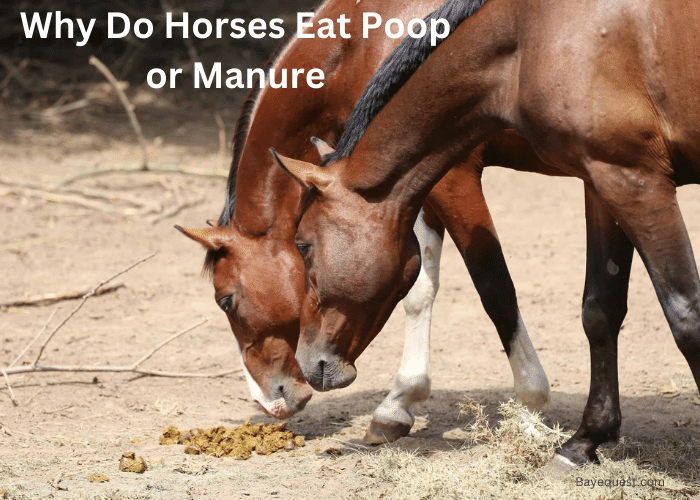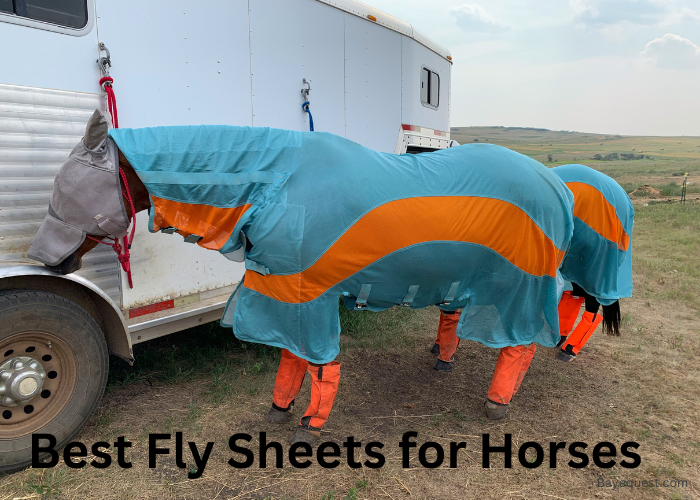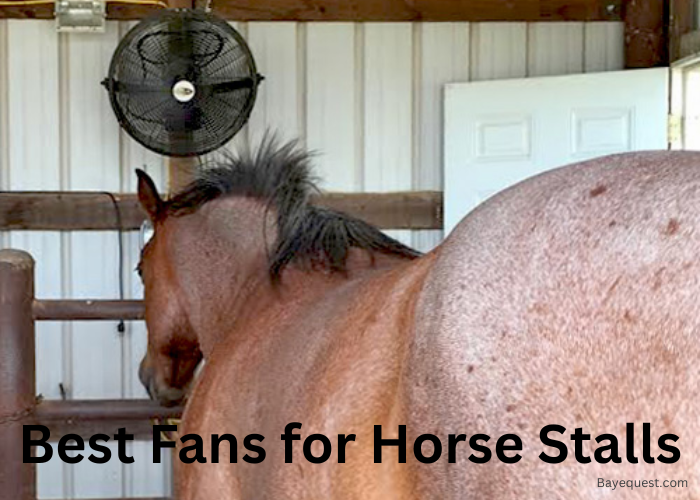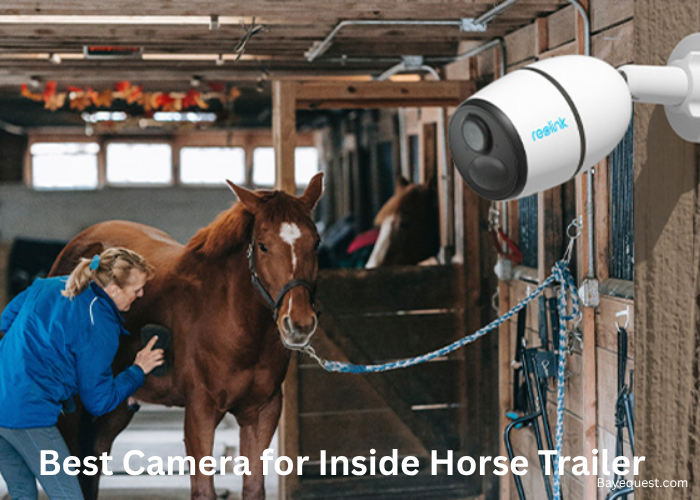Did you know that up to 30% of foals exhibit coprophagia, or eating manure? As an equine expert, I’ve studied this surprising behavior extensively.
Many horse owners are puzzled and concerned when they see their horses eating poop. In this article, we’ll explore the reasons behind this habit, from nutritional gaps to natural curiosity.
Join us as we demystify this behavior and uncover why it’s not as strange as it seems.
Why Do Horses Eat Poop or Manure? Key Takeaway
Horses eat poop or manure mainly due to boredom, hunger, or dietary imbalances. Lack of fiber or essential nutrients can also lead to this behavior. It might also occur if the horse is trying to replenish gut bacteria. Ensuring a balanced diet and proper forage can help prevent this.
Understanding Coprophagia
Coprophagia, or the act of eating poop, is not as odd in the animal world as it might seem to us. For horses, it can be a way to pick up essential nutrients and beneficial gut bacteria they missed the first time their food went through their digestive system.
It’s especially common in young foals as they build a healthy gut. Sometimes, horses do it out of boredom or if their diet lacks certain elements.
While it might raise eyebrows, it’s often a natural behavior that doesn’t always signal a problem. However, if an adult horse does it a lot, it could be worth a check to make sure their health and diet are on track.
Why is My Horse Eating Poop? (11 Reasons Explained)
Horses eat manure or poop for several reasons that might seem odd but have underlying benefits or indicate certain needs.
Here’s a brief look at these reasons:
1. Kickstart the digestive system
Young foals often eat the feces of their mothers to ingest beneficial bacteria. This act helps establish a healthy gut flora, crucial for digesting their fibrous diet efficiently.
It’s a natural way to kickstart their digestive system and ensure they can break down and absorb nutrients as they grow.
2. Learning about safe plants to eat
By consuming the feces of their herd mates, young horses can learn about the types of plants that are safe to eat.
This behavior can be helpful in wild or feral horse populations, where diet choices directly impact survival.
3. Obtaining deoxycholic acid
Deoxycholic acid is a special ingredient made by our bodies that helps break down and absorb fats from the food we eat. Think of it as a helper that makes sure we get all the good energy from our meals.
In horses, eating poop might be one way they try to get more of this helper into their system. This is especially true if their bodies aren’t making enough of it on their own.
4. A diet low in fibre
Horses that lacks sufficient fiber might turn to eating poop as a way to supplement their intake. Fiber is essential for proper digestion in horses, aiding in gut motility and the prevention of issues like colic.
When their regular diet falls short, horses might instinctively seek out alternative sources of fiber, including feces.
5. Boredom or stress
Just like humans, horses can get bored or feel stressed if they don’t have enough to do or if they’re in an uncomfortable situation. When this happens, they might start eating poop as a way to keep themselves busy or to cope with how they’re feeling.
It’s like how some people might bite their nails or snack out of boredom.
6. Investigating new tastes and textures
Horses are curious creatures. They like to explore their surroundings, and that includes trying out different tastes and textures they find in their environment.
Eating poop can be a part of this exploration, especially for younger horses who are learning about their world.
7. Underfed
If a horse isn’t gisn’tg enough food, it might start eating poop to fill the gap. It’s thIt’sway of trying to get more nutrients or simply to make their stomachs feel fuller.
This behavior is a sign that their diet needs a closer look to make sure they’rethey’reg enough to eat.
8. High starch diet
A diet that’s that’sn starch and low in fiber can cause digestive problems for horses. It might lead to them eating poop as a way to add more fiber to their diet or because their gut health is out of balance.
Horses need a good amount of fiber for their digestion to work properly.
9. Feeding frequency
How often a horse is fed can influence this behavior too. Horses prefer to graze and eat small amounts throughout the day.
If they’rethey’reed once or twice a day, they might eat poop to make up for the times when they don’t hdon’tood available.
10. Medical conditions
Certain health issues can lead to an increase in coprophagia (the term for eating poop).
If a horse has a problem with its digestion or if it’s noit’ssorbing nutrients properly, it might turn to eating poop as a way to cope with these issues.
11. Vitamin K deficiency
Vitamin K is important for blood clotting and bone health. If a horse isn’t gisn’tg enough of this vitamin, it might eat poop as a way to try and get more.
The microbes in poop can produce vitamin K, so this behavior could be an attempt to supplement their intake.
Horse Eating Droppings and Manure Health Implications
When horses eat manure, it can have a range of health implications, both positive and negative. Understanding these can help you make informed decisions about their care.
Positive implications
Gut health. Consuming manure can help young foals establish a healthy gut microbiome. The beneficial bacteria in manure can aid in digestion and improve nutrient absorption.
Nutrient absorption. Manure may contain undigested nutrients or microorganisms that produce Vitamin K. This can be beneficial for horses, aiding in nutrient recycling and improving their nutrient intake.
Negative implications
Parasite risk. The most significant risk of horses eating manure is the transmission of parasites. Manure can contain eggs or larvae of internal parasites that can infect horses.
Disease transmission. Beyond parasites, manure can harbor bacteria and viruses that may cause diseases. While the horse’shorse’s system can often handle these pathogens, young, old, or immunocompromised horses might be at risk.
Nutritional imbalances. If a horse is eating manure because of nutritional deficiencies in its diet, this behavior might indicate that its nutritional needs aren’t aren’tfully met.
Toxin ingestion. In some cases, manure could contain toxins, either from plants that are toxic to horses or from medications excreted by other animals. This could pose a health risk to horses consuming the manure.
Behavioral issues. While not a direct health implication, a horse’shorse’snt consumption of manure might indicate underlying issues like stress or boredom.
Preventive Measures and Solutions of Horse Eating Poop
Preventing coprophagia (horse eating manure) involves a combination of management practices, dietary adjustments, and environmental enrichment.
Here are some effective preventive measures and solutions:
Environmental management
- Clean pastures and stalls regularly
- Provide adequate forage
- Environmental enrichment
Dietary adjustments
- Assess and optimize diet
- Increase fiber intake
- Regular feeding schedule
Health and Behavioral Interventions
- Routine veterinary care
- Deworming program
- Behavioral training
Monitor and Adjust
- Observe behavior
- Adjust management practices
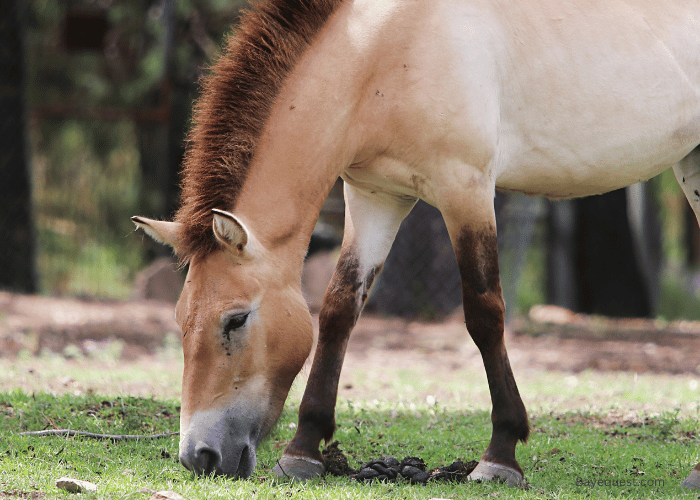
Do Healthy, Well-Fed Horses Eat Manure?
Healthy, well-fed horses do not eat manure. This behavior is more common in horses that are bored, stressed, or experiencing nutritional deficiencies.
Ensuring a balanced diet with adequate fiber and essential nutrients is crucial to prevent this behavior. Providing mental and physical stimulation, such as toys or regular exercise, can also help.
If a healthy horse starts eating manure, consult a veterinarian to rule out any underlying health issues.
Read also: How to Compost Horse Manure.
Is My Horse Eating Manure Because It Is Missing Nutrients in Its Diet?
Your horsehorse’seat manure due to missing nutrients in its diet. Nutritional deficiencies can lead to this behavior.
Ensure your horse gets a balanced diet with enough fiber and essential vitamins. Check the quality of hay and feed you provide.
Sometimes, horses eat manure to replenish gut bacteria. Regularly consult with a veterinarian to assess your horse’s diet and health.
Providing mineral supplements can also help. Ensure your horse has access to clean water. Monitoring and adjusting your horse’s diet can prevent manure eating.
If the behavior persists, seek professional advice for a thorough health evaluation.
Conclusion: Why Does a Horse Eat Manure?
We’ve uncovered that coprophagia reflects complex behaviors. While it might seem odd, this act can signal the necessity for dietary adjustments, or environmental enrichment.
Addressing it requires understanding its underlying causes—ranging from nutrient absorption to boredom. By ensuring a balanced diet, maintaining clean living spaces, and offering regular veterinary care, you can mitigate risks and foster your horse’s well-being.
This exploration seeks to make our equine companions healthy and happy. Now, read our comprehensive article on freeze branding horses to understand another aspect on horses care.




